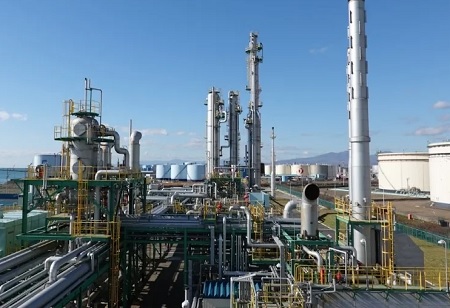
Japan Boosts Climate Efforts with New CCS Tech and Capacity Legislation

 The House of Councillors in Japan has approved a new legislation aimed at enhancing the business landscape for carbon capture and storage (CCS) technology, crucial for realizing a decarbonized society. The majority-backed law mandates the government to implement a permit system for businesses, facilitating the capture of CO2 emissions from industries of various sizes and their subsequent underground storage. This initiative is a pivotal component of Japan's comprehensive strategy to attain net-zero carbon emissions by 2050.
The House of Councillors in Japan has approved a new legislation aimed at enhancing the business landscape for carbon capture and storage (CCS) technology, crucial for realizing a decarbonized society. The majority-backed law mandates the government to implement a permit system for businesses, facilitating the capture of CO2 emissions from industries of various sizes and their subsequent underground storage. This initiative is a pivotal component of Japan's comprehensive strategy to attain net-zero carbon emissions by 2050.
In order to cultivate an enabling business environment for CCS initiatives, Japan's Ministry of Economy, Trade, and Industry (METI) will institute a licensing framework. This system will encompass rights for storage and exploration drilling alongside the formulation of business and safety guidelines for storage firms and CO2 pipeline transport entities. Initially, test drilling permits at potential CCS sites will be granted for a period of four years. METI will designate appropriate geological storage zones as 'specified areas' and invite operators, conferring prospecting and storage rights upon licensed entities.
Operators of CCS projects are required to obtain approval for their execution plans from the Minister for Economy, Trade, and Industry. Following the stabilization of stored CO2, management responsibilities will be assumed by the Japan Organization for Metals and Energy Security (JOGMEC). Operators will bear responsibility for compensation in case of accidents, irrespective of intent or negligence. Alongside the CCS legislation, the House of Councillors has also endorsed a subsidy framework. This system is designed to reduce the price disparity between hydrogen and natural gas, thereby encouraging hydrogen as a feasible next-generation energy alternative.
This comprehensive approach strengthens Japan’s efforts to reduce carbon emissions through CCS and supports the broader adoption of hydrogen energy, aligning with the country’s long-term environmental goals. Japan’s newly approved law is crucial to achieving a decarbonized economy. It’s an extension of the Green Transformation (GX) Policy that existed since last year. Unveiled in February 2023 and approved in July 2023, Japan’s GX policy integrates fiscal and policy measures, potentially amounting to a $1 trillion (150 trillion yen) budget. This policy provides a roadmap for the next decade, balancing economic growth with environmental sustainability.
Japan’s Prime Minister Fumio Kishida said, “First of all, green transformation, or GX in short, does not just mean the departure from fossil energy. It involves the implementation of major reforms in energy, all industries, and our economy and society toward achieving the goal of carbon neutrality by 2050. To this end, Japan has made a highly challenging international pledge of a 46 percent reduction in greenhouse gas emissions by fiscal 2030”.
Through the enactment of these legislative measures, Japan seeks to establish a sturdy framework for CCS and low-carbon hydrogen, aligning with its enduring goals of decarbonization and economic advancement. These laws represent Japan's substantial strides towards a sustainable, decarbonized future, harnessing the potential of both CCS technology and hydrogen energy to combat climate change.

